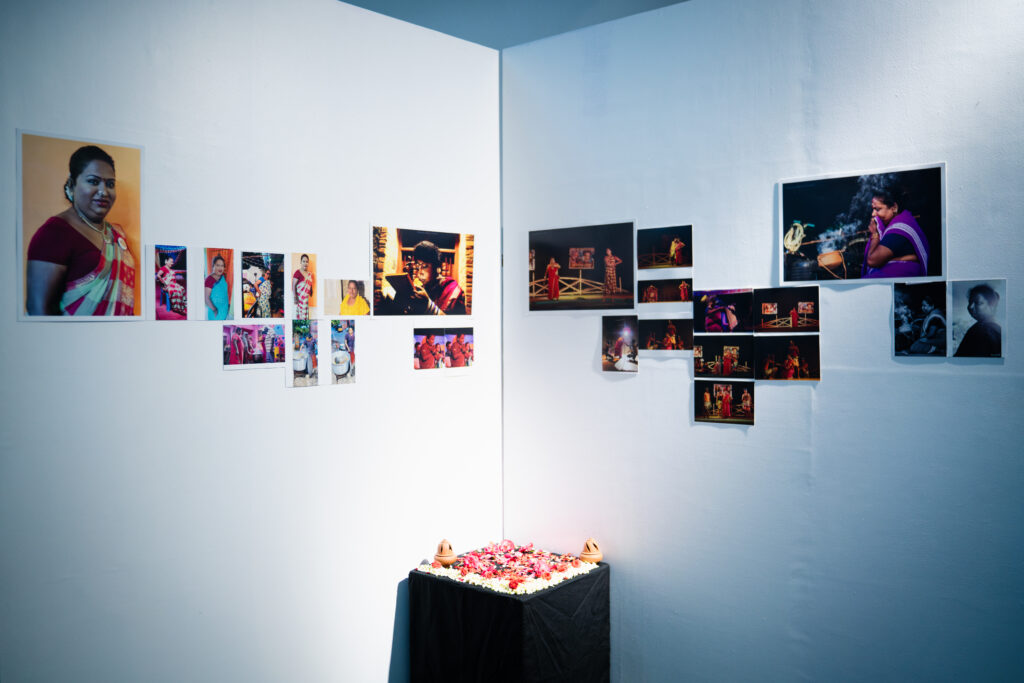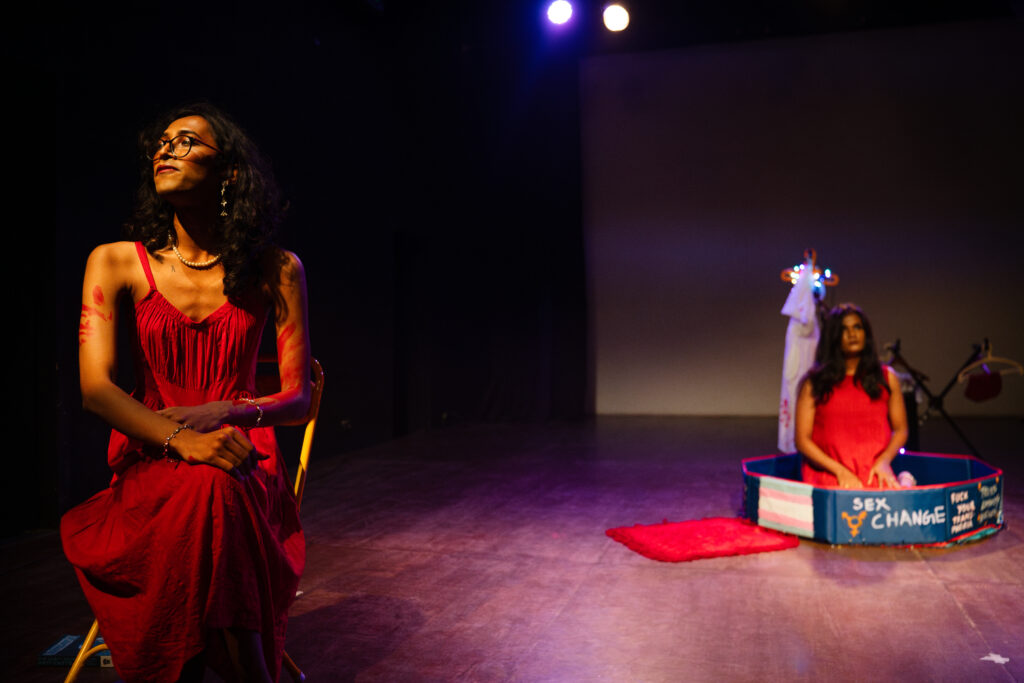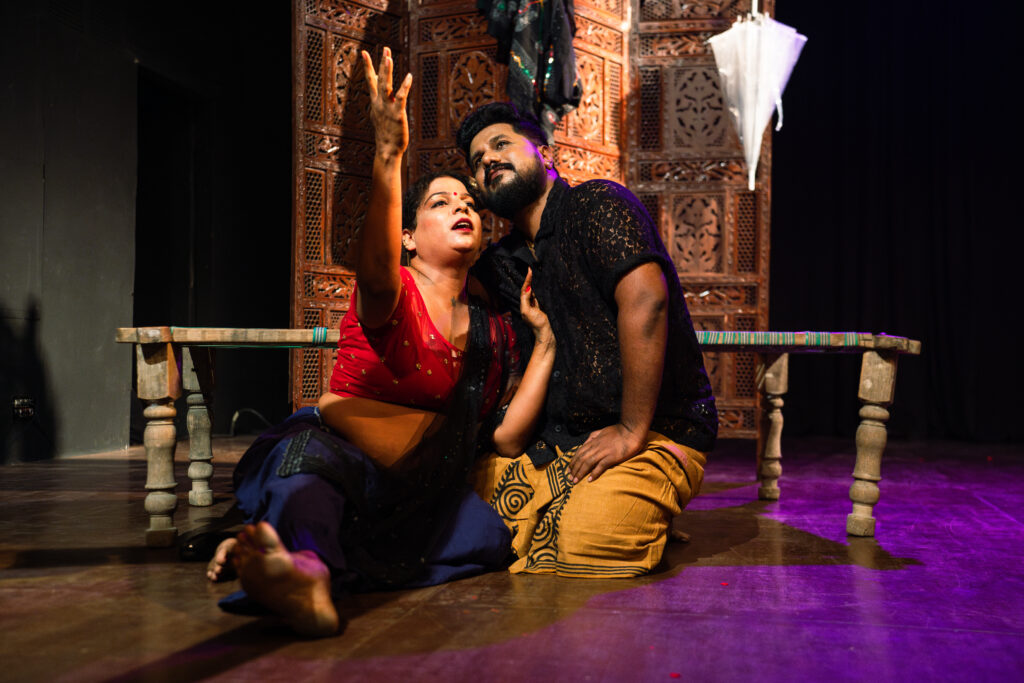Remembering Dayamma: In Grief, Celebration And Protest
In Chennai, a theatre festival paid a moving tribute to a beloved trans elder and stage stalwart, pushing boundaries and transforming the stage into a space of resistance and queer joy
- Archita Raghu

“Epadi Dayamma, namma marrapom? Marandum, epadi irrupom (how can we forget you Dayamma, and if we do, how can we be)? Can crores of rupees fill the pain?” sang trans artiste Gaana Vimala to the beats of the parai drum.
This rendition of maata gaana, a Tamil folk dirge born on the streets of Chennai, filled the stage of the Alliance Française (AF) Madras during the Dayamma Theatre Festival in Chennai. It was a tribute to the late celebrated trans elder, theatre artiste and activist Dayamma (also known as Ramya) who passed away three years ago. But it was also a memorial to all the transwomen and others from the queer community who are no more.
As sambrani smoke and the scent of rose petals wafted through the air, Dayamma’s chosen family took the stage, dressed in fine silks and mallipoo (jasmine), for the nallaedakkam (mourning ritual). Held in late June, this three-hour celebration was organised by Kattiyakari, the Trans Community Kitchen (TCK), and AF Madras.
“People said I was delusional – without a rupee in hand, I thought we should hold a celebration of our journey and our art forms to honour her,” said queer activist and theatre director Srijith Sundaram, who brought the show together.
The Dayamma Theatre Festival is likely the only one named after a transwoman.
And it offered a space to marginalised performers from across communities and artforms like koothu (street theatre), cabaret, and drama. The festival came as an act of solidarity, with everyone chipping in. “Love and family were at the centre of the festival, with the posters, stage design and lighting being shaped collectively. It passed through everyone’s hands, the way a child is raised in a big family,” said Srijith.
The tone of the performances remained political though satire and humour were in plenty – there was Sadat Hasan Manto’s Insult translated to Avamanam, starring Suganthi; Sowindhariya performed a cabaret-style choreography set to the film song Minniki Minniki and Lakshya recited verses that were like an angry meditation on slurs. There was also a reimagining of the street theatre form, therukoothu.
In a satire scripted by the ThiruQueer troupe, cis-het men are in a minority in an office and have to hire a consultancy for affirmative action and a nosy Tamil Brahmin couple deal with trans neighbours. In all, there were 12 varied, vibrant snapshots of the lives of the LGBTQIA+ community.
The audience, urged to celebrate because “Dayamma would have liked the noise”, responded with joyous shouts of “Vaa thalaivi (come leader!)” And “Once more!”
Dayamma, Full Of Cheer And Giving
Dayamma’s stint in theatre began when Srijith invited her to join the Kattiyakari troupe. She was reluctant at first but once she took the leap, she proved to be a stage natural. She featured in its landmark plays including Nooramma: Biriyani Durbar on a transwoman’s fight for dignity and the 2017 drama Manjal on the life of manual scavengers.
But Dayamma was more than an actor and activist, she was full of life, colour, laughter and all things sensory.
“Think of sappadu (meal), sambrani, silk sarees, Illyaraja’s songs and koothu – these were Dayamma’s cherished items. I always remember her wearing cotton sarees and jasmine in her hair,” said Srijith of the much-loved actor and humanitarian.

Dayamma was born a Muslim in north Chennai but came to be known as Ramya to the trans elders and those in the jammath system (a family of thirunangai or transwomen).
In the mid 2010s, those who visited the corridors of Rajiv Gandhi Government Hospital near the Central Station are likely to have chanced upon her. She took on the role of a ‘dayamma’, or a caregiver or healer, to those admitted to the hospital for gender affirmation surgeries.
It was here that Srijith and Dayamma met and began their long association. “In 2009 or so, I was visiting a friend, undergoing a surgery. It is believed that it takes 44 days for those who undergo gender affirmation surgeries to recover, rest and eat nourishing dishes. It is a period of painful healing. After this, she would care for them. She knew what food to give them, she provided mental support, acted as their counsellor, and empathised with their pain,” Srijith said.
On the 44th night, she would call everyone and conduct a paal utradal function to celebrate the gender transformation with haldi (tumeric) and paal (milk). A platter of bajjis (fritters) would go around. She took on the role of raasi ana amma (beloved mother) and stayed till the end of every ritual.
Dayamma grew up in the narrow lanes of Vannarpettai in north Chennai, an area often neglected by policy and governance. She used to beg on trains for a livelihood but she had a fan following among the travellers and even the railway police because of her cheerful nature. Her capacity for generosity and compassion were unbounded; she believed life was to be a celebration. As Srijith recalls, “She would often tell me, I die, send me off with celebrations.”
Dayamma was unabashedly superstitious, with a fondness for black cats. She would often take on the role of the maruladi (thirunangai women who dance in a state of trance), and maintain the idols of the deities her community worshipped.
Her sense of humour was now legendary. Co-actors recalled her giggling during a break and asking: “I need to pass gas. Should I do it here, or go in private?”
Food And Friendship
“When you go knocking at the doors of a man or woman’s house, they may or may not give you food. But if you go to a transwoman’s home, they’ll definitely feed you,” said Srijith. During Kattiyakari rehearsals, Dayamma would arrive with a large katta of tomato rice, eggs and karuvadu (dried fish) wrapped in thaiyal (dried leaf used to parcel food, especially by the marginalised communities of north Chennai.)
Food is central to how organiser and activist Aruvi remembered Dayamma, as well. While studying at Hyderabad Central University, Aruvi fondly recalled how her thozhi (comrade) would whip up home food, omelets and such, during visits to Tsunami Quarters.
And Dayamma’s love for feeding communities persisted in Trans Community Kitchen’s mission.
During the pandemic, newspapers were filled with stories of deaths, loss of livelihoods and poverty and Dayamma would be in tears. “How can people die of hunger? she would ask. Soon in North Madras, along with trans activist Sowndharya, we started a trans community kitchen,” Srijith said. This kitchen was run by the trans community, and funded by queer communities and well-wishers.
As the lockdown raged, a team of over 10 transwomen began serving up meals to the destitute, homeless, trans communities and disabled, distributing them from Porur and Tsunami Quarters. The Trans Community Kitchen was something of an Avenger’s team, as Aruvi put it, each person with a backstory. Under the tagline of Oru Pidi Anbu (a fistful of love), the collective continues to function, and caters to the needs of those in need.
Playing Gangamma, The Oppressor
“I don’t know how to read or write, but theatre provided transformation. I had my role and I had to perform it, and I was not inferior here:” Aruvi remembered Dayamma telling her.
Kattiyakari was a mixed crowd of members of the queer community, transwomen, sex workers and allies. “In Tamizh, kattiyakaran means narrator or sutradhar, but it is a male persona, so I coined the word kattiyakari, which could be any gender. I wanted this theatre to be a platform for all marginalised groups, LGBTQI+, sex workers, Dalits,” Srijith had said in an earlier interview to Behanbox.
In 2015, when organiser member Anish Anto joined the troupe, he found every conversation between cast members leading back to Dayamma. “When I met her, she was patient, quiet, and had a naughtiness to her. Dayamma was pure. She was subtle on stage and found a fan following for her acting,” he said, recalling how she fondly called him “bacha (child)”.
During rehearsals, Dayamma learned dialogues as they were read out to her because she could not read. But her role in Kattiyakari’s growth was crucial, Srijith pointed out.
In Molaga Podi (chilli powder), a play by Tamil writer Bama on the links between caste and land, Dayamma was cast in the role of the oppressor, Gangamma. She had to be violent, holding someone by the hair, hitting them, and putting molaga podi on her face. In rehearsals, Dayamma would be frustrated with herself. She would mutter: “It’s not happening”. The cast once found her crying during tea break, and she said she was upset because “I don’t like to oppress someone.”
For all her reservations, her performance as Gangamma at the National School of Drama in Delhi was terrifying and Bama herself found the rendition unforgettable. It was a play of opposites, where seasoned director, writer and artiste Living Smile Vidya played the oppressed character alongside Dayamma.
The play became syllabus material for the NSD, said artist Harish Subramaniam and curator of the Dayamma Theatre Festival. He pointed out how significant this was: “When you think of art forms, where do you see trans people? Nowhere,” Harish said.
Dayamma nursed her love for art and theatre, accompanying Srijith to festivals across the country that featured his works.
Priceless memories of an angry Dayamma and her passionate engagement with theatre trickled into trans artiste Sowmiya’s memory during the nallaedakkam. Once, during a koothu performance in another city, she had been furious with the distracted crowd for not paying attention to the performance.
Remembrance As Resistance
In popular media, the name of a transgender comes up almost always in the context of a tragedy or a crisis, As Aruvi said in her performance of ‘Body/Boundaries’ during the festival: “Where have you read about us? A medical textbook or a psychiatric manual, a police case or an obit? I want to say I want to be the last transexual person to write a suicide note. Me and every other transwoman I know has written one, and we are here despite it, we have transitioned.”

To mourn one of its own is itself a radical act for members of the queer community, and to invite audiences to partake in the grief was even more so. Around 28 trans persons died by suicide, and 48 in accidents, per the 2022 NCRB data. From 1967 to 2013, there are no records of the deaths of trans persons. As BehanBox reported, the real number of deaths of the trans community is rarely reflected in data owing to procedural issues around self-identification.
So, when the trans theatre community decided to celebrate Dayamma’s life, the question was how. “I see theatre as a space for all emotions, not just joy or grief. And we wanted to do all that she did or wished to do,” said Srijith.
Dayamma’s death hit the trans community in more ways than one, it was a reminder also of the fragile nature of their lives. “When it comes to my queer family, I wonder: how am I going to die? Who will mourn me? Society will never understand what it means to lose a trans parent or sibling. It’s like losing hope,” said Harish.
Solidarity And Safe Spaces
Subaltern music forms like oppari, a folk dirge, and gaana have little place in the mainstream cultural spaces of Chennai. In theatre too, women and marginalised communities tend to be excluded, said Srijith.

“Organisers of theatre festivals ask us to pay for space or bring troupes that have studied theatre. This is a stage for Dayamma, and for all in the community, across art forms. Everyone has to fight for space on stage, but even there the cis community dominates. Two women I brought in, educator Muthammizh and lawyer Thilagavathi, asked if they were taking up too much stage space. But I ask – who decides that? This should be an inclusive space.”
The festival was also meant to create a safe platform for performers who wished to push cultural boundaries. One example was “record dance”, the equivalent of the item number in Bollywood films. It is usually considered raunchy and low brow. “But for us, it’s a euphoric form of queer artistry,” said Aruvi.
The poster, which captures a smiling Dayamma in the backdrop of pastel colours and flowers, took illustrator River tree to four days. “To carry her legacy forward, it’s a huge and beautiful thing. As a younger trans artist, to be drawing a trans elder – it involved complicated feelings. It was joyful, cathartic and soul-rewarding,” he said. “It was hard work because I’m also disabled. I went through a lot of pain and couldn’t touch anything to draw for the next two weeks.”
The team faced threatening calls and obscene comments for staging the festival. But this is not the first time the organisers dealt with this kind of hostility – the pride and Koovagam festival (an annual festival of trans individuals during April or May in Villupuram) draws this kind of reaction too. But for all the risks, the organiser said the Dayamma Theatre Festival is set to return. And next time, they hope, there will be performances from other parts of the country.
We believe everyone deserves equal access to accurate news. Support from our readers enables us to keep our journalism open and free for everyone, all over the world.

